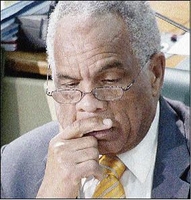Columns By Category
Popular Articles
- THE REALITY OF TACKY AND SAM SHARPE
- PLEASE DON’T BETRAY US AGAIN POLITICIANS
- CRY, MY MURDEROUS COUNTRY
- MODERNIZING THE PNP: VERSION.2020
- IS THE EXCHANGE RATE ON TARGET OR IS IT A WHOPPER?
- CARICOM: BEACON OF DEMOCRACY OR COWARDLY DISGRACE?
- DEMOCRACY PREVAILS IN THE UNITED STATES
- THE CRIME STATISTICS SPEAK FOR THEMSELVES
- PETROJAM, OIL PRICES, AND THE $7 TAX
- Kevin O'Brien Chang | Brains, not brutality – smart(phone) crime fighting
- TERRORISM IN JAMAICA
- STOP CURRENCY CRISIS TALK
- 'CASTIGATED KD' AND THE 9 YEAR WONDER
- GET PAST MERE TALK ON DONS AND GARRISONS
- LOW VOTER TURNOUT MYTHS AND ELECTION PREDICTIONS
- HOW GREAT CAN BROGAD BE?
- PNP WAS SOCIALIST FROM THE START
- AN AGE AND GENDER RE-ALIGNMENT ELECTION?
- Most influential Jamaican of 2010-2019?
- NO GAYLE, NO RUSSELL, NO TALLAWAHS
Audley and Omar: Good Sense Prevails, but ...
- 5-3-2009
- Categorized in: 2009 Articles, Politics
http://jamaica-gleaner.com/gleaner/20090503/focus/focus2.html
Published: Sunday | May 3, 2009
Kevin O'Brien
Jamaica has its problems, but for the most part our political system works pretty well. The Budget Debate so far has been a case in point. Finance Minister Audley Shaw's almost-excellent presentation was countered by Opposition spokesman Dr Omar Davies almost-excellent critique.
From a big-picture point of view, it's hard to see what other approach Shaw could have taken. With bau-xite earnings having collapsed - hopefully temporarily - to virtually nothing, the gaping revenue hole had to be plugged. Most responsible economists agree that a widened general-consumption tax (GCT) is the fairest and most effective avenue open to the Government. The fuel tax specifically makes sense because: a) It's easier to cut back on driving than eating; b) we import more oil than anything else; c) Petrol was last year much higher than it is now, even with GCT added.
In the present circumstances, Shaw would frankly have been pretty foolish not to impose a petroleum tax. Painful as it might be, it's far less distressing than any other realistic alternative. Most people on the ground realise there was really no other option. The muted public response to Opposition leader Portia Simpson's call to wear black and turn on headlights was proof of this, as were the almost comical attempts made to stage roadblocks that mostly fizzled out like damp firecrackers.
The Jamaican people are not stupid. They watch cable TV and read the Internet. They know this is the worst global economic crisis in 80 years, and that the International Monetary Fund predicts that the entire world economy will shrink this year. Just about every country on the planet is being forced to take a stiff dose of economic medicine. If it wasn't a fuel tax, it would be something just as bad or worse.
Yet, amid all the budgetary common sense was one exceedingly stupid proposed measure, namely the plan to tax printed books and computers. This was attempted before in 2003 by the previous administration, and due to swift citizen protest and strong lobbying, the attempt failed. You would think those drafting this Budget would have remembered this.
Cash-strapped government

Shaw
Desperate times call for desperate measures, but it's difficult to fathom how even the most cash-strapped government could see any logic in trying to tax books, especially in a country whose literacy rate is already woefully low. And since many now read more on a computer screen than a printed page, taxing computers is just as bad. Bruce Golding is forever going on about creating jobs and making Jamaicans more productive. Well, imposing a tax on knowledge is just about the worst possible way of going about this.
Some argue that it makes sense in the context of closing off tax exception loopholes that are often abused, as with, say, school bags. But the proposed exemptions for academic material mean that window of wrongdoing would still be open. Any money the Government could earn from this measure would come at an incalculable cost. Basic laws of demand and supply say increasing the price of anything means less of it will be consumed. A tax on books will mean less reading, and more ignorance.
The modern technological world began with Gutenberg's printing press. For the cost of one hand-copied book, a thousand could now be printed, in essence making society a thousand times more informed. This dramatically reduced cost of knowledge was the catalyst for the scientific revolution and all the medical and mechanical wonders that have followed. In light of this, the equation is simple - any move that makes information more expensive is an attempt to reverse civilisation.
Book and computer tax

Davies
It's not like there aren't other avenues to get the comparatively tiny revenues a book and computer tax will generate. The most obvious is a sin tax on cigarettes and alcohol. "More books, less cancer, less drunks" - now there's a positive message.
And how about a graduated increase on licensing motor vehicles? Leave the cost at the same rate for vehicles worth, say, less than $1,000,000. But levy a one per cent annual cost on any addition valuation over this. Anyone who can afford a $6,000,000 car can afford a $60,000 annual licensing fee.
We should also think about increasing income tax for high-income earners. How about making the personal-income tax rate the same as the corporate tax rate for any earnings above more than, say, $6,000,000? Meaning that up to $6,000,000, the tax rate would remain at 25 per cent, with any additional earnings above this attracting a 33 per cent rate. Again, those who pull in this kind of money could not be hurt much by a mere eight per cent tax increase. It would certainly pale in comparison with Britain's new 50 per cent tax rate for those earning more than 150,000 pounds.
A modestly graduated income tax would also send a message to the public that we are all in this together, and we all must make our sacrifices, poor and rich. One of Jamaica's great competitive advantages vis-à-vis other similar developing countries is our enviable stability.
We have never had anything as in, say, Thailand where mass protests regularly shut down the country. But stability can only be preserved if the less fortunate feel they are not being taken advantage of, and that the better heeled are also willing to share the pain.
Dr Omar Davies' rebuttal to Shaw was for the most part reasoned and logical. His tone was almost that of a willing-to-be-helpful uncle. Let's hope the entire debate is carried out in this spirit. But has he recently got a new pair of glasses? How come he never noticed all that unused agricultural land that needs to be put into production during his 14 years as finance minister?
As with Shaw's, so it was with Davies's presentation which contained a huge logical flaw. For after having warned us about Jamaica's increasing inability to place long-term bonds, he turned around and called for an increase in the tax rate on government bond interest. This would be like a market woman whose mangoes are not selling and in danger of spoiling deciding to increase her prices.
Long-term effect
Increasing the tax on interest would have an immediately negative impact on demand on government bonds. And Dr Davies must be aware of the long-term effect that effectively abrogating what is in effect an agreed upon contract with bond holders would have on Jamaica's dealings with the international financial markets. Who would want to invest in a country which capriciously decides to increase taxes on your earnings from 25 per cent to 33 per cent or 50 per cent? And a Jamaica that can no longer borrow on the international markets will be very shortly a bankrupt Jamaica.
What makes far more sense is Dr Davies' proposal to use $3 billion of the combined $9 billion in the Universal Access Fund and the Tourism Enhancement Fund for infrastructural investment. Private Sector Organisation of Jamaica (PSOJ) head, Chris Zacca, publicly endorsed this measure, providing a wonderful opening for any sensible government to jump on-board immediately. When last did the Jamaica Labour Party, People's National Party and PSOJ all agree on anything? Here indeed is a golden opportunity for some national unity - 'All those in favour of raiding the Universal Access and Tourism Enhancement Funds, say 'Aye'.
The level-headed tone of both Budget speeches left me more optimistic about Jamaica. Such national maturity should help us weather the global economic hurricane without fatal damage.
And let's hope Prime Minister Golding's upcoming presentation acknowledges the folly of taxing books and computers. A real big man is never afraid to admit he's wrong.
